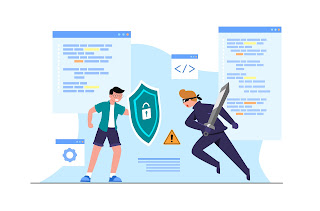Hacking for Good: Explore the Ethical Side of Cybersecurity
In the realm of cybersecurity, ethical hacking plays a vital role in safeguarding digital systems and combating malicious activities. Contrary to its negative connotation, ethical hacking, also known as white-hat hacking, involves using hacking techniques for legitimate and responsible purposes. This article delves into the world of ethical hacking, shedding light on its importance, benefits, and how you can embark on a journey to become an ethical hacker through specialized courses like ethical hacking course in Noida.
Understanding Ethical Hacking :
Ethical hacking is the practice of identifying vulnerabilities in computer systems, networks, and applications with the owner's permission. Ethical hackers, also known as penetration testers or white-hat hackers, employ their skills to detect security weaknesses before malicious actors can exploit them. By simulating real-world attack scenarios, ethical hackers help organizations strengthen their defenses and protect sensitive data. This proactive approach to cybersecurity is essential in today's digital landscape, where cyber threats are becoming increasingly sophisticated and prevalent.
The Importance of Ethical Hacking :
Ethical hacking serves as a crucial countermeasure against cybercriminals. By proactively testing systems for vulnerabilities, ethical hackers can identify weaknesses before they are exploited by malicious actors. This proactive approach enables organizations to patch vulnerabilities, fortify their defenses, and minimize the risk of data breaches, financial loss, or reputational damage. Additionally, ethical hacking course in Noida assists in ensuring compliance with industry standards and regulations, such as the Payment Card Industry Data Security Standard (PCI DSS) or the General Data Protection Regulation (GDPR). By embracing ethical hacking practices, companies can demonstrate their commitment to protecting their customers' information and maintaining a secure digital environment.
Benefits of Ethical Hacking Courses :
Ethical hacking courses provide individuals with the knowledge and practical skills needed to excel in this field. These courses cover a wide range of topics, including network security, vulnerability assessment, penetration testing methodologies, and the legal and ethical aspects of hacking. By enrolling in an ethical hacking course, you gain hands-on experience with industry-standard tools and techniques, learning how to identify vulnerabilities, perform penetration tests, and provide actionable recommendations to enhance cybersecurity. Moreover, ethical hacking courses often offer certifications, such as the Certified Ethical Hacker (CEH) or Offensive Security Certified Professional (OSCP), which validate your skills and enhance your career prospects in the cybersecurity industry.
Becoming an Ethical Hacker
To become an ethical hacker, it is essential to cultivate a deep understanding of computer systems, networks, programming languages, and security protocols. Specialized ethical hacking courses provide comprehensive training that equips individuals with the necessary technical expertise and ethical mindset. These courses offer hands-on labs, real-world simulations, and guidance from experienced instructors, allowing aspiring ethical hackers to develop their skills and gain practical experience. Additionally, joining online communities, attending cybersecurity conferences, and participating in bug bounty programs can further enhance knowledge and provide valuable networking opportunities within the ethical hacking community.
Conclusion
Ethical hacking represents the noble side of cybersecurity, where individuals utilize their hacking skills for positive purposes. By learning ethical hacking course in Noida you will learn best practices, organizations can bolster their defenses, protect sensitive data…


.jpg)

Comments
Post a Comment